You searched for: poland
<< Previous | Displaying results 76-100 of 1567 for "poland" | Next >>
-
Blanka Rothschild describes antisemitic regulations in occupied Lodz, Poland
Oral HistoryBlanka was an only child in a close-knit family in Lodz, Poland. Her father died in 1937. After the German invasion of Poland, Blanka and her mother remained in Lodz with Blanka's grandmother, who was unable to travel. Along with other relatives, they were forced into the Lodz ghetto in 1940. There, Blanka worked in a bakery. She and her mother later worked in a hospital in the Lodz ghetto, where they remained until late 1944 when they were deported to the Ravensbrueck camp in Germany. From Ravensbrueck,…
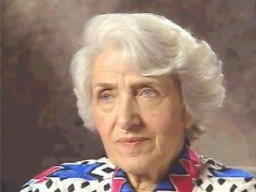
-
Sophie Turner-Zaretsky describes living conditions while in hiding in Poland
Oral HistorySophie was born Selma Schwarzwald to parents Daniel and Laura in the industrial city of Lvov, two years before Germany invaded Poland. Daniel was a successful businessman who exported timber and Laura had studied economics. The Germans occupied Lvov in 1941. After her father's disappearance on her fifth birthday in 1941, Sophie and her mother procured false names and papers and moved to a small town called Busko-Zdroj. They became practicing Catholics to hide their identities. Sophie gradually forgot that…
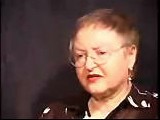
-
Frank Bleichman describes conditions in and dangers facing a partisan camp in the forests of Poland
Oral HistoryFrank was one of seven children born to a religious Jewish family in Kamionka, in the Lublin district of Poland. Germany invaded Poland in September 1939. When deportations of Jews from the Lublin area began in 1942, Frank joined a group of Jewish partisans who roamed the forests in search of weapons and food. After obtaining weapons by posing as Soviet paratroopers, they were able to defend themselves against German raids and take revenge against collaborators. They gradually made connections with Polish…
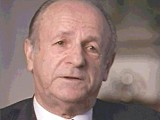
-
Blanka Rothschild describes the beginning of the German invasion of Poland when she and her family were in Lodz
Oral HistoryBlanka was an only child in a close-knit family in Lodz, Poland. Her father died in 1937. After the German invasion of Poland, Blanka and her mother remained in Lodz with Blanka's grandmother, who was unable to travel. Along with other relatives, they were forced into the Lodz ghetto in 1940. There, Blanka worked in a bakery. She and her mother later worked in a hospital in the Lodz ghetto, where they remained until late 1944 when they were deported to the Ravensbrueck camp in Germany. From Ravensbrueck,…
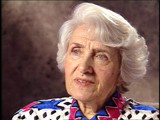
-
Aron (Dereczynski) Derman describes events that took place upon the German invasion of Slonim, Poland
Oral HistoryAron was born to a middle-class Jewish family in Slonim, a part of Poland between the two world wars. His parents owned a clothing store. After studying in a technical school, Aron worked as a motion-picture projectionist in a small town near Slonim. The Soviet army took over Slonim in September 1939. War broke out between Germany and the Soviet Union in June 1941. Aron returned to Slonim. The Germans soon occupied Slonim, and later forced the Jews into a ghetto. Aron was forced to work in an armaments…
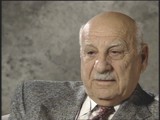
-
Ruth Berkowicz Segal describes finding her father in Vilna after he fled Soviet-occupied eastern Poland
Oral HistoryWhen German forces invaded Poland in September 1939, Ruth's father fled to eastern Poland. Upon the Soviet occupation of eastern Poland, he fled to Lithuania. Ruth left Warsaw with two friends to find her father and later joined him in Vilna. After Soviet forces occupied Lithuania, Ruth and her father obtained transit visas for Japan, but only Ruth obtained a Soviet exit visa. Her father insisted she leave and not wait for him. Ruth traveled by the Trans-Siberian Railroad across the Soviet Union to…
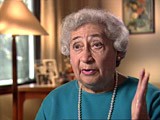
-
Sophie Turner-Zaretsky describes her years in Poland living under a false identity
Oral HistorySophie was born Selma Schwarzwald to parents Daniel and Laura in the industrial city of Lvov, two years before Germany invaded Poland. Daniel was a successful businessman who exported timber and Laura had studied economics. The Germans occupied Lvov in 1941. After her father's disappearance on her fifth birthday in 1941, Sophie and her mother procured false names and papers and moved to a small town called Busko-Zdroj. They became practicing Catholics to hide their identities. Sophie gradually forgot that…
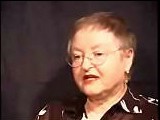
-
Alisa (Lisa) Nussbaum Derman describes a dangerous journey to reach partisan territory in the Naroch Forest, Poland
Oral HistoryLisa was one of three children born to a religious Jewish family. Following the German occupation of her hometown in 1939, Lisa and her family moved first to Augustow and then to Slonim (in Soviet-occupied eastern Poland). German troops captured Slonim in June 1941, during the invasion of the Soviet Union. In Slonim, the Germans established a ghetto which existed from 1941 to 1942. Lisa eventually escaped from Slonim, and went first to Grodno and then to Vilna, where she joined the resistance movement. She…
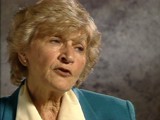
-
William (Welek) Luksenburg describes the first night of the German invasion of Poland
Oral HistoryShortly after the German invasion of Poland in September 1939, William's family was ordered into a ghetto and his brother went to a work camp. William bribed officials to discharge his brother from a hospital destined for evacuation to Auschwitz. Later, after escaping from a prison camp to tend to his brother, William was jailed. He was sent to Blechhammer, Gleiwitz (where he met his future wife), and other camps. William collapsed during a death march near the Austrian border, but was then liberated. His…
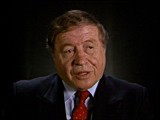
-
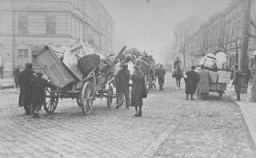
-
Hunger in the ghetto
PhotoChildren eating in a Warsaw ghetto street. Warsaw, Poland, between 1940 and 1943.
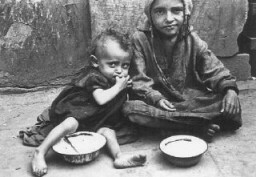
-
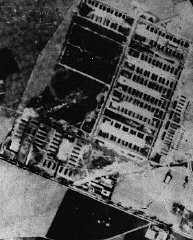
-
David Bayer
ArticleDavid Bayer lived in Kozienice, Poland. Explore his biography and learn about his experiences during World War II and the Holocaust.
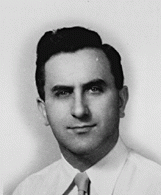
-
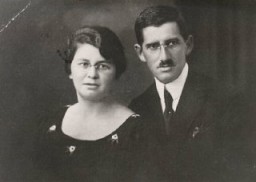
-
Mordecai Pinchas Szabasson
ID CardMordecai, known in Yiddish as Motl, was born to a religious Jewish family with six children. His hometown of Kozienice, located near a birch forest, had an important lumber industry. After graduating from secondary school, Mordecai entered the lumber business. His small, successful company bought and sold lumber. 1933-39: A few months after the Germans invaded Poland in September 1939, Mordecai's father was warned to leave because, as a prominent member of the community, it was likely that the Germans…
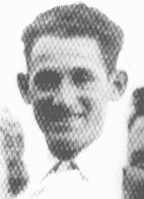
-
Yitzhak Gitterman
ArticleYitzhak Gitterman was a director of the American Jewish Joint Distribution Committee in Poland and a member of the underground Jewish Fighting Organization.
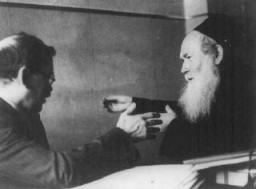
-
Mendel Felman
ID CardOne of seven children, Mendel was raised in a Yiddish-speaking, religious Jewish home in Sokolow Podlaski, a manufacturing town in central Poland with a large Jewish population of about 5,000. Mendel's parents ran a grain business. As a teenager, Mendel liked to play chess, and he completed his public schooling in Sokolow Podlaski in 1931. 1933-39: After finishing middle school, Mendel went to work in his parents' business. When he was 18, he fell in love with Frieda Altman who was in the same Zionist…
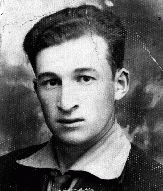
-
Pants belonging to Marjan Glass
ArtifactPants worn by Marjan Glass as he dug anti-tank ditches for the defense of Warsaw, Poland, and then as he hastily fled the city ahead of the German advance on September 7, 1939. Glass, a lawyer, escaped with his wife and three-year-old son, and his wife's mother and brother. He left without taking the time to change from his soiled work clothing. [From the USHMM special exhibition Flight and Rescue.]
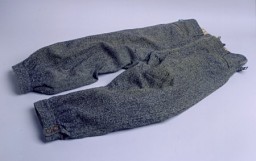
-
Lublin/Majdanek Concentration Camp: Areas of Research
ArticleLearn about areas of research related to the number of deaths at the Lublin/Majdanek concentration camp system.
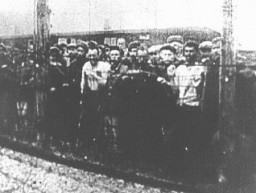
-
Partisan Groups in the Parczew Forests
ArticleArmed Jewish resistance began in Poland in 1942. Learn more about partisan activity in the Parczew forests during World War II.
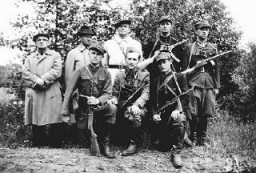
-
Hela Riemer
ID CardHela was raised in Dukla, a Polish village near the Czech border. In 1928 she married Elimelech Riemer and the couple settled in Berlin. Two years later, their only child, Edith, was born. The Riemers lived in an apartment building that housed offices of the Communist Party of Germany. 1933-39: Six years ago, in 1933, the Nazis accused Hela's family of breaking into the Communist Party's offices, so they escaped to a Polish town near the German border. A few days ago, just before the German invasion [of…
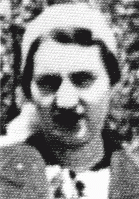
-
Max Diamant (now Josef Burzminski)
ID CardMax was born to a Jewish family in the Austrian capital of Vienna. When he was a small child his family moved to Przemysl, an urban center in southeastern Poland with a largely Jewish population. Max spent the remainder of his childhood there; his parents ran a small grocery and cafeteria to support their five children. 1933-39: The Germans reached Przemysl on September 14, 1939. It was a brilliant sunny day when planes suddenly appeared; Max's family thought the planes were their own until they began…
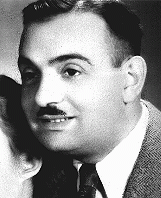
-
Frederick Fleszar
ID CardFrederick was the oldest of two sons born to Polish immigrants in Syracuse, New York. In 1922 Frederick's father, who was a musician, moved the family back to Poland where they settled in Poznan. There Frederick started public school and was accepted to the boys section of the prestigious Poznan Cathedral Choir. 1933-39: In 1933, at age 17, Frederick graduated from secondary school and enrolled in medical school at the university at Poznan. He sang with the choir for the last time the day he graduated…
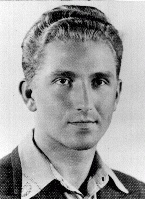
-
Althammer
ArticleThe Germans established the Althammer camp in September 1944. It was a subcamp of Auschwitz. Read more about the camp's history and conditions there.
